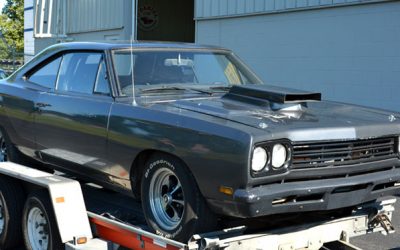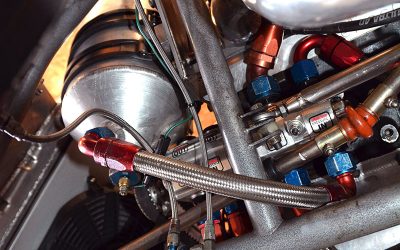by Mike Tontimonia
 The Dream is always the same. A hunter drops the tailgate of his truck and out bounds a handsome, powerful pointer. The dog is perfectly marked, its eyes deep with understanding, its demeanor alert.
The Dream is always the same. A hunter drops the tailgate of his truck and out bounds a handsome, powerful pointer. The dog is perfectly marked, its eyes deep with understanding, its demeanor alert.
The hunter gives a simple command and his trusted four-legged partner charges across the stubble field like a canine vacuum, processing every hint of airborne scent as it searches acre after acre. The hunter nods knowingly, his animal is a graceful extension of his own will. They are one. In our dream, the big pointer responds obediently. The hunter sounds a single, quick note on a small brass whistle. His dog swings quickly around to see what it is the boss wants to say.
“Magnum (a popular dream dog name), check it!” the hunter calls across the goldenrod and swings his arm in the direction of a thicket. Magnum jumps to the task, charging through the autumn grass to search out the thicker cover. And indeed, there is feathered scent there.
Magnum skids to a rigid point. The bird is pinned and Magnum looks remarkably like a photo on the cover of Dream Dog Magazine, right down to the last hair.
The hunter walks tenderly up behind Magnum, whispers a nearly silent “good dog” then steps up for the flush. Of course, a single shot brings the bird down and of course, Magnum remains rock solid in point.
“Magnum fetch.” And Magnum lines out for the downed bird, gathers it up like a careful farmer gathers eggs and delivers it lovingly to our dreaming hunter.
“Good dog Magnum.” The dog gets an appreciative pat on the head and charges off for another find. The pat is pay enough. Anything to please the boss. End of dream.
 But all too often, the dreaming hunter buys a real hunting dog puppy with real money and the dream turns to a real nightmare. The dream becomes reality, but dog and hunter are out of sync. Instead of the perfect hunting machine of our dreams, we end up with a hunter hunting his dog and his dog doing who-knows what dogs do when they are nowhere to be found.
But all too often, the dreaming hunter buys a real hunting dog puppy with real money and the dream turns to a real nightmare. The dream becomes reality, but dog and hunter are out of sync. Instead of the perfect hunting machine of our dreams, we end up with a hunter hunting his dog and his dog doing who-knows what dogs do when they are nowhere to be found.
All too often in the real world the hunter drops the tailgate and ends up with paw prints across his chest as Fido heads for the high country triggering the start of the daily battle of the wills. The hunter ends up hoarse at the end of a day and it ain’t from saying “good dog”.
Fido turns out to be selectively deaf and out of control. His aggressive fetches turn birds into mush and his points seldom produce birds because he’s already flushed them before the hunter gets there.
What’s wrong with this picture? Generally, it’s a bad match, nothing more. That is, so many times, hunters choose a hunting dog based on what it is they perceive ought to happen. They see themselves in their mind’s eye, in full command of their dog and they also see their dog, willing and able to meet their expectations. And it could have been that way if the hunter and the dog were of matching personalities. That’s right, almost any hunting dog, if genetically sound and of reasonably good working lineage, can be taught to be the perfect partner – or perfect enough, if it’s a good match.
Still don’t get the drift? Let’s say you are a yeller. You like to rough your dog a bit. You’re loud, forceful, and you are physical. Don’t buy a soft dog. Don’t buy a Brittany or another breed that has its potential talent laced with tender feelings. You need a dog that can handle your attitude. Like a lab or an English pointer or even a beagle. Heck, that group of toughies will never begrudge you a little yelling, in fact, they’ll pay little attention to it. But that Brit, it’ll cower and the hurt will last for a while. In fact, it may last forever.
Now that general statement does not make Brittanies bad or labs and beagles good. It does however, serve as warning that to enjoy your hunting dog, pick a breed that suits your personality, not your dream.
Looking for a good example of match making? Let’s reflect on a visit the author had over ten years ago with Paul Richards, a bird dog man from North Canton, Ohio.. And you couldn’t visit with Richards without visiting with The Boz (Field Champion Lord Bryon Bosley), Richard’s outstanding German Shorthair Pointer.
 The Boz has more ribbons and gun dog championships than Carter’s got back pills. His pedigree reads like who’s who in the royal history of his breed. He’s the documented descendent of the very best hunting and field trial Shorthairs in the world and he’s racked up an impressive list of youngsters. He can find birds in a Walmart parking lot and he was, once seen, the dog in so many hunter’s dream.
The Boz has more ribbons and gun dog championships than Carter’s got back pills. His pedigree reads like who’s who in the royal history of his breed. He’s the documented descendent of the very best hunting and field trial Shorthairs in the world and he’s racked up an impressive list of youngsters. He can find birds in a Walmart parking lot and he was, once seen, the dog in so many hunter’s dream.
Richards? Well he’s got a mother who loves him regardless of his faults but that’s about it. More important, The Boz and Richards had each other and it was a perfect match. They were both confident, assertive and in charge of their world. Because they were matched so well, they seemed to communicate with little effort.
Like the time Richards cast a young Boz on a southern plantation to hunt wild quail. It didn’t take long for Bosley to wind a find and zero in on the scent. When Richards approached his pointing pup, The Boz tilted his head slightly, rolled his eyes at Richards, and grinned – or seemed to grin.
Richards loves to tell this story. “I came up to Boz and he said it all with his expression. He had never had a noseful of quail like this, a wild covey of several big birds, and was telling me that he had a 200 pound bird located and that I ought to go back for a bigger gun,” Richards recalled.
The Boz was powerful. At a field trial, he would run big, eating up acres like a Kansas combine. Driven by desire, The Boz lived on the edge of control but Richards knew where that fine line started and he kept his dog on the safe side. He can rein in his Shorthair pointer on command. But if Richards set out for a day of hunting, The Boz seemed to know. Dog and man stayed in close contact, hunting together in visual and verbal contact and enjoyed every minute of it.
The Boz lived in the Richards house. He slept on the Richards’ bed. He, without condition, was part of the Richards family. He was the perfect match for Richards, a high-power businessman.
Now here’s what was interesting. The Boz was an individual. His personality was a lot German Shorthair to be sure but more than that, he was The Boz, dominating and independent. He hated to honor the point of another dog. He did it because Richards required it, but he hated it because to Boz, anything less than a find was second place.
Richards had other Shorthair pointers. Abby was soft, easily hurt. She was caring, a real lover. Abby liked her time alone, quiet time. Never-the-less, she was athletic and strong, a good hunter and very trainable. According to Richards, he had to treat Abby differently than he treated The Boz. He had to lower his voice and be more gentle. An accomplished dog man, Richards could adjust. Too many hunters can’t.
Richards said that it’s been his experience that through association and training, dogs and their handlers seem to learn how to tolerate, even understand each other. More than that, hunting teams learn what to expect from each other. A dog raised on soft talk will grow to listen closely. Another pup raised around loud voices and hyper activity will reflect that behavior.
 And individuals of a breed differ. One Labrador retriever might seem to need a lot of yelling to stay under control while the next Lab might operate best with subtle commands and little coaxing. These two dogs might have been litter mates but their training differed. They’ve learned what to expect of their owner. What about the general characteristics of the working breeds?
And individuals of a breed differ. One Labrador retriever might seem to need a lot of yelling to stay under control while the next Lab might operate best with subtle commands and little coaxing. These two dogs might have been litter mates but their training differed. They’ve learned what to expect of their owner. What about the general characteristics of the working breeds?
Retrievers live to please. They are bred to hunt for their handler, to act on human instruction. Retrievers constantly watch their owners (or should) for indication of their next move. Indeed, because of the inbred desire to please, retrievers are generally the easiest of all field dogs to train. They tolerate poor training and poor handling. They are forgiving and kind.
The pointing breeds hunt for themselves. They point instinctively but learn to hunt upwind as they search. Some pointing breeds are tougher than others, hard headed and require a firm, knowing hand. Other seem soft, easily hurt, almost timid. All pointing breeds learn to hunt big or in close, depending on their training and trainer. They are fun to work with but require lots of ongoing training to be sharp.
Of the hound breeds, beagles are the most popular. Always merry, ready to hunt or to play, beagles are compact, easy to tend and, for the most part train themselves. They are independent hunters, generally pay little or no attention to their handlers and they are acceptant of any human personality.
So dream. Go ahead dream. But choose your hunting dog as you would a mate. After all, you’ve got to get along for a long time.




0 Comments